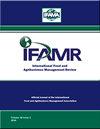通过公平贸易实现包容性增长:中国非政府组织参与的经验案例
IF 1.5
4区 经济学
Q3 AGRICULTURAL ECONOMICS & POLICY
International Food and Agribusiness Management Review
Pub Date : 2023-07-06
DOI:10.22434/ifamr2023.0008
引用次数: 0
摘要
作为对不同地区经济发展不平衡的回应,本研究旨在探讨公平贸易非政府组织(NGO)如何在面临制度支持不足和发展中市场当地条件具有挑战性的地区促进包容性增长。通过对中国农村小规模茶叶供应的五年纵向案例研究,本文探讨并确定了一系列阻碍经济增长、挑战公平贸易目标实现的制度空白。我们系统地描述了公平贸易非政府组织如何介入并与当地供应链中的其他参与者进行整合。研究结果揭示了非政府组织在应对制度空白、促进公平贸易方面所扮演的重要而复杂的角色。从制度的角度来看,本文发现公平贸易非政府组织可以通过在市场结构建设、规范推广和认知发展方面的合作,利用和塑造地方制度,从而实现包容性增长。我们的研究结果有助于人们理解非政府组织在公平贸易、包容性增长和减贫方面可能发挥的关键作用。它们为非政府组织、小农户以及相关政府机构消除贫困、实现经济平等和包容性增长的举措提供了重要而实用的指导。本文章由计算机程序翻译,如有差异,请以英文原文为准。
Inclusive Growth Through Fair Trade: An Empirical Case of NGOs’ Involvement in China
As a response to imbalanced economic development across different regions, this study aims to explore how the Fair Trade nongovernmental organisations (NGOs) promote inclusive growth in areas facing insufficient institutional supports and challenging local conditions in a developing market. Through a 5-year longitudinal case study in the context of small-scale tea supply from rural China, this paper explores and identifies a set of institutional voids blocking economic growth and challenging the realisation of the Fair Trade goals. We systematically describe how the Fair Trade NGOs intervene and integrate with other actors in local supply chains. The results reveal important and complex roles the NGOs play in coping with the institutional voids to stimulate Fair Trade. From an institutional perspective, this paper finds that the Fair Trade NGOs can leverage and shape local institutions through collaboration in market structure building, norm promotion, and cognitive development to achieve inclusive growth. Our findings contribute to the understanding of the crucial roles NGOs may play in Fair Trade, inclusive growth, and poverty alleviation. They offer important and practical guidance for NGOs, small farmers, as well as relevant government agencies in their initiatives to fight poverty and achieve economic equality and inclusive growth.
求助全文
通过发布文献求助,成功后即可免费获取论文全文。
去求助
来源期刊

International Food and Agribusiness Management Review
AGRICULTURAL ECONOMICS & POLICY-
CiteScore
2.90
自引率
0.00%
发文量
0
审稿时长
>12 weeks
期刊介绍:
The IFAMR is an internationally recognized catalyst for discussion and inquiry on issues related to the global food and agribusiness system. The journal provides an intellectual meeting place for industry executives, managers, scholars and practitioners interested in the effective management of agribusiness firms and organizations.
IFAMR publishes high quality, peer reviewed, scholarly articles on topics related to the practice of management in the food and agribusiness industry. The Journal provides managers, researchers and teachers a forum where they can publish and acquire research results, new ideas, applications of new knowledge, and discussions of issues important to the worldwide food and agribusiness system. The Review is published electronically on this website.
The core values of the Review are as follows: excellent academic contributions; fast, thorough, and detailed peer reviews; building human capital through the development of good writing skills in scholars and students; broad international representation among authors, editors, and reviewers; a showcase for IFAMA’s unique industry-scholar relationship, and a facilitator of international debate, networking, and research in agribusiness.
The Review welcomes scholarly articles on business, public policy, law and education pertaining to the global food system. Articles may be applied or theoretical, but must relevant to managers or management scholars studies, industry interviews, and book reviews are also welcome.
 求助内容:
求助内容: 应助结果提醒方式:
应助结果提醒方式:


